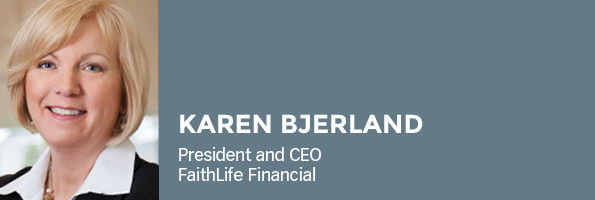
Faith in life insurance
Karen Bjerland is president and CEO of FaithLife Financial a fraternal benefit society with a distinct financial planning vision. The organization takes a traditional approach to financial planning and then layers on top of that stewardship principles that individuals of the Christian faith can incorporate into their decision-making process if they choose.
I think we are at that point in our industry where we (women) need to be stronger in our view on our right to be in a leadership role.
“We have a vision of vibrant communities of people who live by Christian financial principles, which then inspires them to grow in stewardship, compassion and generosity,” says Bjerland. These principles come directly from the Christian faith, such as “God owns everything; He created everything, we are managers or stewards of the resources with which we’ve been gifted.”
Not all members – members are individuals who buy a FaithLife Financial product – will decide to include these principles in their financial planning, but those who do can receive help from agents in making decisions to define how much is enough for their personal and family’s financial security. This enables them “to think very freely about what they can give to others…A good way to describe us is an insurance social enterprise,” says Bjerland who, in addition to a long career with FaithLife Financial (formerly Lutheran Life), practiced social work early in her career.
FaithLife Financial also supports various programs that help the organization meet its mission that includes helping to build a better world. Among these is a matching grant program for fundraisers undertaken by FaithLife Financial’s 370 chapters across the country. These fundraisers might be for projects such as helping a local food bank, or contributing toward disaster relief. “We will match what they raise up to $500 three times per year. If you look at all of that in aggregate, we normally make a charitable impact of more than $3 million per year.” This impact includes FaithLife Financial’s matching grants, the money raised by the chapters and the dollar value of volunteer hours to complete the event.
“FaithLife Financial exists for people and not just for profit. We cover our members with insurance products that provide money when needed most – and as importantly, with vibrant community support… Each time a member pays a premium for their FaithLife Financial life insurance plan, a portion of that premium is given back to make a difference in the lives of people – building a better world, one community at a time,” she says.
As one of just a handful of women CEOs in the insurance industry, Bjerland says the accomplishment she is most proud of is contributing toward the strategic rethinking and restructuring of FaithLife Financial.
“When I started as CEO in 2010, we began a very significant journey of refreshing our vision, revitalizing our business model and totally reinventing our administrative systems. We have a new back office to reinforce our foundation for future growth. We exited the business of manufacturing wealth products and are focusing on our core business – life insurance.”
Why focus on life insurance? “It’s what we do best in terms of manufacturing and distributing…We still offer guaranteed annuities, but we don’t manufacture segregated funds because of the capital risk. We’re small so we need to choose our areas of focus and do it well, rather than do too much and not do it well enough.”
FaithLife Financial also experimented with brokerage opportunities to distribute its products but given the organization’s unique value proposition, Bjerland explains that they have concluded that the career distribution system best meets their needs. FaithLife Financial currently has close to 40 career agents and about 25 brokers. It would like to double the number of career agents within five years and has hired a new vice-president of distribution as part of its focus on expanding its career channel. Bjerland adds that this new focus does not mean the organization will cut all ties to brokerage. “We’ll still maintain the relationships with the brokers who have that Christian inclination and who already have a niche in our marketplace.”
FaithLife Financial also has an MGA relationship with IDC Worldsource Insurance Network which can provide its agents with access to products that it does not manufacture, for example segregated funds and universal life insurance. “Our market doesn’t purchase an awful lot of that product (UL), so that’s one we outsource to what we call our resource centre – an MGA relationship with IDC Worldsource.”
Bjerland believes there is a great deal of opportunity for growth, especially in the FaithLife Financial’s middle market niche. “Life insurance ownership is at its lowest level in 30 years…There is a huge need and tremendous opportunity. We have a well-defined niche and we’re positioned to capitalize on that.”
Advice for women leaders
Bjerland has words of advice for women leaders in the insurance industry. She urges them to “look at their leadership role and their right to be in it as an expectation rather than an exception. I think we’re at that point in our industry where we need to be stronger in our view on our right to be in a leadership role, not as something that is privileged, or an equal opportunity kind of right – but because we’ve got the skills, experience and the courage to do the job.”
She adds, “It’s not an issue of gender one way or another…That is something as a woman in a leadership role it is important to get your head around. You’re here because of what you can do and what you have proven to be able to do in the past. It’s your success that speaks.”
Bjerland pointed to two other industry CEOs (also featured in the Women of Influence report) as role models. “Look at Marianne Harrison, look at Kathy Bardswick. They are tremendously strong leaders in our industry. Those are the people that others who want to develop a leadership role can emulate.”








